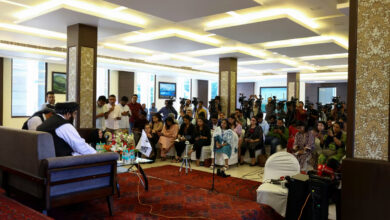One hundred years ago, more than a million people marched in streets across Europe on the first International Women’s Day. They called for an end to discrimination and for women to have the same rights as men to work, vote and shape the future of their countries.
One hundred years on, the reality is that women are still much more likely to be poor and illiterate. They earn only 10 percent of the world’s income but perform two thirds of the world’s work. They produce up to 80 percent of the food in developing countries but own only one percent of the land.
In many countries, they are still told what they can do, or even what they can wear. Women in Saudi Arabia, Chechnya and Iran face harassment if they don’t observe conservative religious dress codes. In contrast, Muslim women in Belgium, France and some parts of Spain may soon break the law there if they do observe them.
Women campaigning for change are often met with derision, abuse or worse. In places like Russia, the Philippines, Mexico and Nepal, leading activists have recently been murdered for speaking out. In China, Bangladesh, India, Zimbabwe and many other countries, they are routinely detained and tortured.
Yet the international community largely ignores these facts. Women's inequality is seen as regrettable but inevitable.
The dramatic events of the past two months have witnessed millions taking to the streets throughout the Middle East and North Africa to call for change.
Women stood beside men as they demanded comprehensive reform and an end to political repression. Both women and men have suffered under these repressive governments. But women have also had to cope with discriminatory laws and deeply entrenched gender inequality.
So it’s no wonder that women took to the streets, cheered loudly when former President Hosni Mubarak fell, and wanted to believe the promise of a new dawn in Egyptian politics. But it remains to be seen how much will really change for the women of Egypt.
Many governments–including many from the West–still only seem to support women’s rights when it’s convenient, and their rights are often used as bargaining chips in the struggle for control of the international agenda.
When negotiations with the Taliban seem like a good step, suddenly women's rights don't matter so much. When they need Pakistan as an ally, they accept the Pakistani government giving autonomy to regions of the country where women are utterly victimized by a parallel legal system. And alliances are made in Iraq with militia that in their spare time attack and kill women’s rights activists.
And so it goes in Egypt, where, as the country begins to look to its future, women are in danger of being sidelined again.
Incredibly, despite decades of discrimination and inequality, women are being denied a role in the creation of a new Egypt. They are being excluded by both the caretaker government and the international community. Most recently, a new national committee formed to write the new Egyptian constitution was composed only of men. This is not acceptable.
If the international community truly cared about women's rights in Egypt, they would be championing women's participation in every aspect of building new systems and institutions.
This behavior by the interim authorities and the international community betrays a sense of paternalism all too familiar to Egyptian women who have spent decades living under an oppressive government supported by supposedly rights-respecting states.
As existing governments scramble to change and new governments emerge, all must commit to respecting women's equality, both in law and in practice. But women will only have that equality if they actively engage in all the negotiations and decisions taking place during this time of transition.
For the promise of change in Egypt and elsewhere in the region—and the world–to materialize, women of diverse backgrounds and political persuasions must be at the table as full partners.
A lot has changed in the last 100 years, and yet many of the same problems remain. In many countries, government commitments to reforms have lagged. Discrimination still cuts deeply across societies, leaving a trail of inequality in its wake.
The call for equality, fairness and respect was at the heart of the first International Women’s Day. A century on, it still is.
Widney Brown is Amnesty International’s Senior Director of Law and Policy




